Nicias
Nicias (c.470-413 BCE): Athenian politician and commander, one of the most important generals in the Peloponnesian War.
The Archidamian War
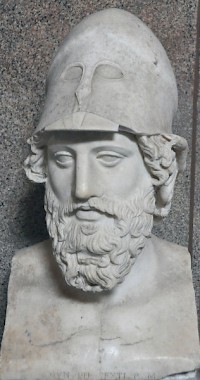
Although Nicias, the son of Niceratus, was born in c.470 and was about forty years old when the Archidamian War between Sparta and Athens broke out in 431, we know hardly anything about his early career. The few recorded facts are not very illuminating. The historian Xenophon mentions that he was very rich, owned more than 1,000 slaves and invested his money in the silver mines. Like all rich men, Nicias spent his money conspicuously to gain the favor of the masses. For example, he sponsored religious processions and theater performances. Like many others who did the same, he became popular, gained votes, and was elected to important offices. After 427, Nicias often acted as strategos, "general".
The war in which he gained fame, the Archidamian War, might have been avoided if the Athenians had revoked the Megarian Decree, but the Athenian politician Pericles had argued that this might be the wrong signal to the enemies of Athens (Sparta, Corinth, and Thebes). It was better to fight a war than to allow other nations to interfere with Athenian policy. Unfortunately, Pericles had greatly overestimated Athens' possibilities. He had believed that the Athenians could leave the countryside to the Spartan invaders and hide behind their Long walls, which made their city unassailable. At the same time, they should strike from the sea at the country of their enemies. The problem was that Athens, which was the richest city of the Greek world, did not have the money for this strategy.
His death in 429 had saved Athens, because it had prepared the way for a better organizer, Cleon, who was able to improve Athens' finances, which were running dangerously low. However, Cleon, who was immensely popular with the masses, was not a commander himself, and the years after the death of Pericles saw a permanent rivalry between Cleon and Nicias.
The difference was more than just about policy: it was also about the style of politics. Although both men were nouveaux riches without noble ancestors, Nicias presented himself as a traditional and conservative democrat, whereas Cleon presented himself as a "new politician" with a more extravagant approach and sometimes radical views. The author of our main source for this period, the historian Thucydides, was a traditionalist too, and as a result all classical sources are hostile to Cleon and sympathetic to Nicias.
Although the rivalry had much to do with style, it was also about content. Cleon was what we would call a "hawk", whereas Nicias, who was certainly no "dove", did not like this particular war. In his view, Athens and Sparta should not be enemies; the real enemies were outside the Greek world. Still, Nicias thought it would be honorless not to fight, wanted one clear victory, and thought that after Sparta had been humilated, peace could be signed. Many people trusted him, if only because his name was believed to bring luck (Nicias << Nikê, "victory"). At first, this difference in attitude was unimportant, but after 425, the disagreement became much more serious.
In 427, Nicias pillaged the coast of Megara, where he occupied and fortified a small island called Minoa, which controled the entrance of the port of Megara. This town, which was so symbolical for this war, was from now on submitted to tight blockade. Next year, Nicias pillaged the independent isle of Melos, and the countryside of Tanagra and Locris, which was also the aim of an Athenian operation from the west, led by Demosthenes. The two armies failed to make contact. In 425, however, Demosthenes achieved some spectacular successes, which included isolating a group of Spartans on the isle of Sphacteria.
Peace
Sparta now offered negotiations, and Nicias was willing to accept peace. After all, Sparta had been humiliated. Many people listened to him. After all, he had shown himself to be one of Athens' most reliable generals.Cleon objected: the strategic position of Athens had not been improved by the war. Seizing Megara, and creating a major obstacle between Thebes and the Peloponnese, was the least that Athens ought to obtain. This convinced the Assembly, which gave Cleon the command of a new operation at Sphacteria. Nicias was ordered to fight against Corinth, and in 424, he seized the island Cythera.
The successes of the Athenian commanders Phormio, Lamachus, Demosthenes, Cleon, and Nicias were followed by setbacks, when the Thebans defeated an Athenian army at Delium and the Spartan commander Brasidas captured Amphipolis. In the Athenian Assembly, more people were willing to listen to politicians like Nicias, who wanted peace with Sparta. In 423, an armistice was concluded, which lasted a year. In the meantime, Nicias besieged Scione, a town that had revolted after the armistice had come into force. The siege was to last a very long time.
When the armistice had expired (spring 422), there was a brief clash at Amphipolis, in which both Cleon and Brasidas were killed, and both sides agreed to conclude peace. This Peace of Nicias was signed in March 421, after ten year's of war. Sparta had failed to overthrow the Athenian empire.
The Entr'acte
In the following years, the dominant player in the Athenian democracy was Alcibiades, a relative of Pericles and in fact the successor of Cleon as a hawk. Although the war was over, he organized a new alliance with the democratic city states on the Peloponnese, in the Spartan backyard. Within three years, the Peace of Nicias had been wrecked, and in the Battle of Mantinea (418), the Spartan king Agis II defeated the democratic coalition.
Alcibiades' next scheme was the conquest of Sicily. Nicias was against this war, because he thought it was too a large project. On the other hand, his honor forbade him to refuse a command. In the Assembly, he said that a very large expeditionary force would be necessary, hoping that the Athenians would understand that conquering Sicily was impossible. The speech backfired, however: the people became more and more enthusiastic, and in the end, Nicias was elected general - against his wishes, but he could no longer refuse after the Assembly had already voted for his proposal to expand the expeditionary force. His colleagues were Alcibiades and Lamachus.
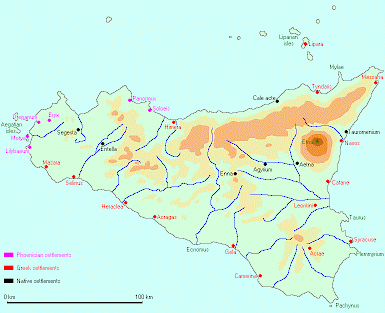
In 415, the expedition started. When the armada arrived on Sicily and the Athenian allies in the west saw the size of the expeditionary force, they started to have doubts. Lamachus now proposed to attack Syracuse, the main city, immediately. Nicias proposed to support the allies and return home before the display of strength had diplomatically backfired. Alcibiades suggested to find more allies, create a base, and attack Syracuse after this had been achieved. This plan was finally adopted and a base was created at Catana, north of Syracuse. In a battle on the bank of the river Anapus, the Syracusans were defeated, and everything was ready for the siege of this city.
Syracuse
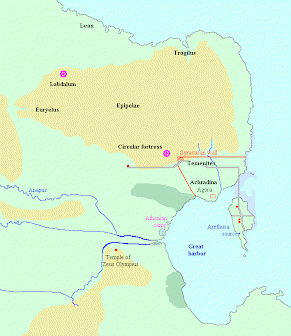
However, the element of surprise was now lost. Even worse, Alcibiades was recalled, leaving two commanders in charge who did not like the strategy they had embarked upon. In the spring of 414, they laid siege to a Syracuse that had been prepared by its democratic leader Hermocrates. The most important improvement was that the northern part of the city had been surrounded by a new wall that made it impossible to storm Syracuse from the north, because there were dangerous rocks to descend before one could reach the wall. To the west of Syracuse was a marshy plain, so that the Athenians could only attack from the northwest. And so they did. Before the Syracusans were able to occupy the plateau known as Epipolae, the Athenians landed at Leon, gained access to the plateau at Euryelus, seized the plateau, and built a large fortress, called "the circle".
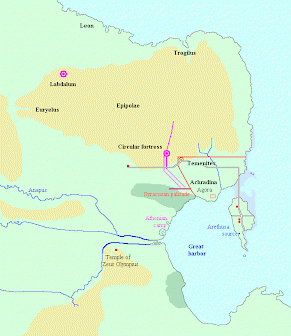
Now, a strange war of walling and counter-walling started. The Athenians knew that they had to hem in the Syracusans, so that they could starve them. They started to build a wall across Epipolae. One wall was to lead to Trogilus the north, and another to the south, to the Great Harbor. The Syracusans responded by digging a trench and building a palisade through the marshy area to the west, so that they would retain command of a road to the inland of Sicily. An elite regiment of Athenian soldiers, commanded by Lamachus, destroyed the palisade, but was unable to prevent an attack on the circular fortress, which could only be saved by setting fire to his supplies of wood. The siege engines were also destroyed. Worse, Lamachus was killed in action. Nicias, who was by now suffering from a serious illness, was left in charge of a war he had always opposed.
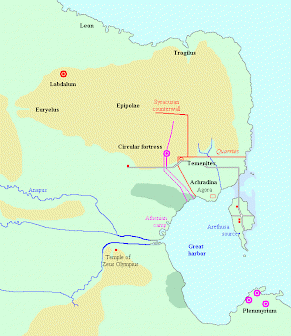
Still, the investment was almost complete; lack of timber prevented the immediate finishing of the northern wall, but this was a matter of time. The Syracusans were already preparing their surrender when they unexpectedly received reinforcements from Corinth and Sparta, commanded by Gylippus. He stormed Euryelus, marched north of the unfinished northern wall, and reached Syracuse. He immediately started to build a new counterwall that was to prevent the Athenians from finishing their northern wall. Nicias understood what was about to happen, but his soldiers were defeated by the Syracusan cavalry and could not prevent their enemies from finishing their counterwall. This was the decisive moment: it was now obvious that the Athenians could not invest Syracuse, which would always be able to obtain supplies. As if to stress this point, Gylippus also captured the Athenian base at Labdalum.
Nicias was unable to formulate a real response. He gathered many troops in three fortresses at Plemmyrium, south of the Great Harbor. It was something of a retreat to safety, which demoralized the men. Obtaining fresh water was difficult, because the Syracusans were superior in cavalry. Seeing that he was no longer besieging but was being besieged, Nicias wrote a letter to Athens, asking for a recall or reinforcements.
The Athenians preferred the second alternative and sent additional troops, commanded by Eurymedon, who arrived during the winter of 414/413, and Demosthenes, who arrived during the summer. This was a bold move, because the war with Sparta was about to start again and the Athenians could not afford to lose troops. (In 413, the Spartan king Agis II would occupy Decelea near Athens, which marked the beginning of the Decelean or Ionian War.) Perhaps the Athenians believed that success at Syracuse might deter other enemies.
However, it was too late. Nicias had already been attacked by the Syracusan navy in the Great Harbor. The Athenians had been victorious, but at the same time, they lost Plemmyrium, which had been attacked by Gylippus. Worse was to come: in a second naval battle, the Athenians were defeated by the Syracusans, who had fortified their ships with stay-beams, so that they could ram their enemies bow on.
The Syracusans once been saved by the timely arrival of Gylippus. As if Fate wanted to restore a balance, or wanted to make sure that Athens would suffer even more, the same now happened to the Athenians: almost immediately after their naval defeat, Demosthenes arrived. Benefiting from the shock that the Syracusans experienced, he immediately tried to occupy the Epipolae plateau, but failed. He now concluded that it was best to break off the siege. It was a disgrace, but there was still an opportunity to minimize the losses. Nicias, however, was against it, and the two commanders decided to wait a bit longer, to see if the Syracusans might collapse - after all, there were reports that they had become weary of the war and were willing to come to terms with the reinforced Athenian army.
Death
However, the Syracusans continued to fight, and Nicias accepted Demosthenes' proposal. Unfortunately, during the night of 27 August 413, when the Athenians were supposed to sail away, there was a lunar eclipse, which Nicias thought was a very bad omen. He ordered to stay another month.
It became almost immediately apparent that this was a serious mistake. The Syracusans now started to block the entrance of the Great Harbor. The Athenians tried to break out, but were defeated in the final naval engagement. Now, finally, Nicias decided to leave his position. In fact, almost everything was lost, because the Athenians had no ships to return home. Still, they tried to reach the safety of Catana in the north, but they were attacked by the Syracusan cavalry and were unable to make much progress.
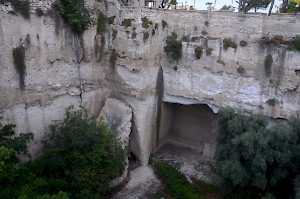
On the sixth day of their march, they gave up, and decided to move to the south - something that the Syracusans had not expected them to do. But it did not improve the situation for the Athenians. Demosthenes' troops fell behind and surrendered on the condition that the soldiers would not be killed. Even slavery was now acceptable. On the seventh day, Nicias was able to defeat his pursuers one more time, but in the end, his men were unable to continue, and surrendered as well (text).
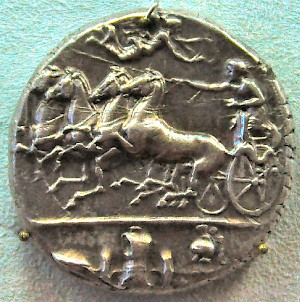
This was the end of the Sicilian expedition, and the beginning of the end of Athens itself. Those survivors who belonged to the Athenian alliance, the Delian League, were sold as slaves. The Athenians were forced to work in a stone quarry, where they died from malnutrition and exposure. Demosthenes and Nicias were put to death. The booty was immense; the Syracusans were able to built a splendid treasury in Delphi to store one tenth of the proceeds of this war.
Thucydides is generally positive about Nicias, and this is the judgment of most ancient authors (e.g., Plutarch of Chaeronea, who wrote a biography of the Athenian general). Modern scholars do not share this view, and think that Nicias took many wrong decisions during the Sicilian campaign. His greatest error was that he argued for more troops to be sent, and asked for reinforcements. The Athenians trusted his judgment and reinforced him; by doing so, a serious defeat got the dimensions of a disaster.
Literature
Plutarch's Life of Nicias is available at LacusCurtius.